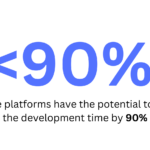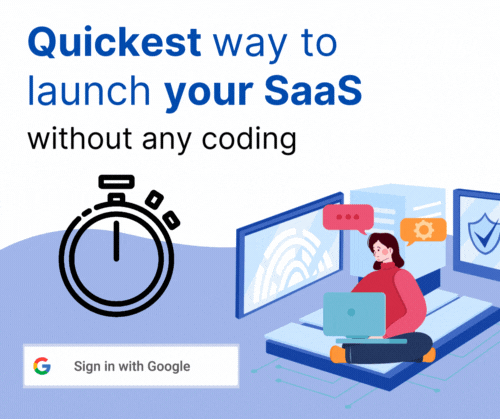The rise of no-code platforms has opened doors for all creators to build stunning applications without any coding skills.
This article delves into the world of no code app builders, exploring the rationale behind choosing this path, understanding different app types, pinpointing the easiest no code app builder for specific app needs, and evaluating crucial factors when making this pivotal decision.
Why Build My App on No Code?
Creating an app used to be a coder's realm, but times have changed. Enter the era of "no code" app development – a game-changer for both tech wizards and novices.
1. Speedy Development
No code platforms offer a straightforward approach to app creation. Get no more tangled in complex coding languages. A recent study found that 70% of businesses reported increased speed in application development by using no-code platforms, emphasizing its efficiency.
2. Easy to access
Technical jargon can be daunting. No code platforms simplify communication. You describe what you need, and the platform understands, making your ideas a reality.
Statistics reveal that around 75% of entrepreneurs encounter difficulty communicating their app ideas to developers. No code eliminates this hurdle, empowering creators to directly shape their apps.
3. Speedy Creation, Minimal Effort
Time is money, and no code saves both. With ready-to-use templates and components, app development accelerates. This efficiency reduces development time by up to 50%, ensuring faster deployment.
Research indicates that traditional app development cycles can take months. In contrast, apps built on no code platforms go live in a matter of weeks, providing a competitive edge.
4. Cost-Efficiency at Its Best
Traditional app development often leads to hefty bills. However, no code significantly slashes costs.
A study by Gartner suggests that by 2024, no code app development will account for over 65% of all app development functions stated the SA Global Advisers. The cost-effectiveness of no code platforms is a major driver of this shift.
Different Kinds of Apps: Web, Mobile, E-commerce, SaaS
Apps come in various forms, catering to diverse user needs and platforms.
Each type demands unique functionalities, interfaces, and compatibility with different devices, necessitating specific development approaches. You might look for developing a:
Web App:
Web apps primarily function through web browsers. Their focus is on presenting information and delivering functionality through a visually appealing and user-friendly interface.
The platform used for building web apps should excel in creating and managing sleek, responsive designs that work seamlessly across various devices and screen sizes.
Mobile App:
Mobile apps operate specifically on smartphones or tablets. User experience (UX) is paramount here. These apps should be intuitive, fast, and optimized for touchscreens.
Hence, choose platforms that emphasize mobile-friendly design, offer various mobile-specific functionalities, and streamline the process of creating responsive mobile interfaces.
E-commerce Apps:
E-commerce apps facilitate online buying and selling. They rely heavily on secure transactions. A no-code platform for e-commerce should integrate robust payment gateways, ensuring secure and convenient payment processing for customers.
Additionally, easiest no code app builder should support inventory management, order tracking, and user account management.
SaaS Apps (Software as a Service):
SaaS apps offer services or functionalities over the internet. These apps often require high levels of customization to suit various client needs. Moreover, scalability is crucial as these apps should accommodate an increasing number of users without compromising performance.
The ideal no-code platform for SaaS apps should allow extensive customization provide infrastructure that can scale seamlessly as well as provide features to manage different user roles or subscription models effectively.
Understanding these unique needs helps in selecting the easiest no code app builder that aligns with the specific requirements of the app you intend to develop. It's about choosing tools that cater to the distinct demands of each type, ensuring a smoother and more efficient development process.
The Right No-Code Builder for Your Specific App
Selecting the easiest no code ai app builder hinges on understanding your app's requirements and functionalities. Different builders excel in various niches, making it essential to match your app's nature with the builder's capabilities.
No-Code Builders for Various App Types:
1. Web Apps: Wix, Squarespace, Webflow
- Intuitive Drag-and-Drop Interfaces: Builders like Wix, Squarespace, and Webflow make creating web apps a breeze. Their intuitive drag-and-drop interfaces empower users to design visually appealing and functional websites or web applications without the need for intricate coding. For those seeking simplicity and ease of use, these platforms are the go-to choice.
2. Mobile Apps: Adalo, Bubble, Thunkable
Diverse Features for Mobile Apps:
- Adalo – Rapid Development: Adalo focuses on simplicity and swift development. It's perfect for those who want to create mobile apps quickly without delving into complex coding. Ideal for startups and small businesses looking for a user-friendly platform.
- Bubble – Robust Functionality: Bubble is known for its robust functionality and scalability. It allows users to build feature-rich mobile apps that can handle complex workflows. If you're aiming for a powerful and scalable mobile app, Bubble is a reliable choice.
3. E-commerce Platforms: Shopify, WooCommerce
Simplified E-commerce Setup:
- Shopify – Easy Online Store: Shopify simplifies the process of setting up an online store. Its user-friendly interface and ready-to-use templates make it an excellent choice for entrepreneurs looking to establish their e-commerce presence quickly.
- WooCommerce – Customization Options: Integrated with WordPress, WooCommerce provides flexibility and customization options for store owners. It's suitable for those who want more control over the look and feel of their online store.
4. SaaS App Builders: Fuzen
Dedicated SaaS Development with Fuzen:

- Reliability: Fuzen ensures data integrity and security, safeguarding sensitive user information. It's a reliable platform that users can trust for the protection of their data.
- Scalability: Fuzen accommodates growing user bases and evolving feature requirements seamlessly. It's designed to scale with your SaaS application as it gains popularity and demands additional functionalities.
- Simplicity: Fuzen provides an intuitive interface for building complex backend structures without the need for extensive coding expertise. This simplicity accelerates the development process, allowing entrepreneurs to focus on creating a feature-rich SaaS application.
- Platform Risk Mitigation: Fuzen mitigates risks by offering a stable and reliable platform for SaaS app development. Users can confidently build their applications, knowing that they have a dependable foundation for their SaaS venture.
Factors to Consider When Choosing a No-Code Builder
As you embark on selecting a no-code builder, several factors warrant consideration to ensure a smooth and efficient app development journey.
1. Pricing:
Subscription Models and Feature Limitations: Evaluate different pricing tiers offered by no-code platforms. Understand the features available at each tier and assess if they align with your app's needs. Consider whether limitations exist in terms of users, storage, or functionalities in lower-tier plans.
Additional Charges for Advanced Functionalities: Some platforms might charge extra for access to advanced features or increased usage levels. Check if there are hidden costs for additional functionalities or higher usage, ensuring your budget aligns with your app's requirements.
2. Maintenance and Reliability:
Platform Stability and Updates: Assess the platform's reliability by researching its uptime history and update frequency. A stable platform ensures your app remains accessible and functional. Regular updates indicate that the platform is actively maintained and evolving.
Support and Troubleshooting: Look for platforms that offer robust customer support. Ensure they provide timely assistance for troubleshooting issues or addressing concerns, as this can significantly impact your app's performance and user satisfaction.
3. Speed and Simplicity:
Rapid Development without Complexity: Seek a builder that accelerates the app development process without overwhelming complexity. An intuitive interface with drag-and-drop functionalities can expedite app creation while minimizing the learning curve for users.
Ease of Use: Platforms that prioritize simplicity can expedite the development process, allowing you to focus more on refining app features rather than struggling with intricate tools and functionalities.
4. Scalability:
Handling Increased User Loads: Consider a platform's capacity to handle increased user activity as your app gains popularity. Ensure the platform can scale up efficiently without compromising performance, maintaining a seamless experience for users even with high traffic.
Adaptability for Additional Features: Evaluate the platform's capability to integrate new features or functionalities as your app evolves. A scalable platform accommodates your app's growth without hindering its performance.
5. Platform Risk:
Reputation and Track Record: Prioritize reputable and established no-code builders with a history of success and positive user experiences. Platforms with a track record of reliability and consistent performance reduce the risks associated with app development.
Reviews and Recommendations: Research user reviews, case studies, and recommendations from industry experts. Real experiences from other users can provide insights into potential pitfalls or advantages of a particular platform, aiding in informed decision-making.
Conclusion:
Finding the easiest no code app builder involves understanding your app's needs, aligning them with the capabilities of different builders, and evaluating essential factors like pricing, reliability, and scalability.
Fuzen stands out as a dedicated platform for SaaS app development, offering a blend of reliability, scalability, and simplicity, making it a prime choice for entrepreneurs looking to dive into the world of SaaS applications without the complexities of coding.








